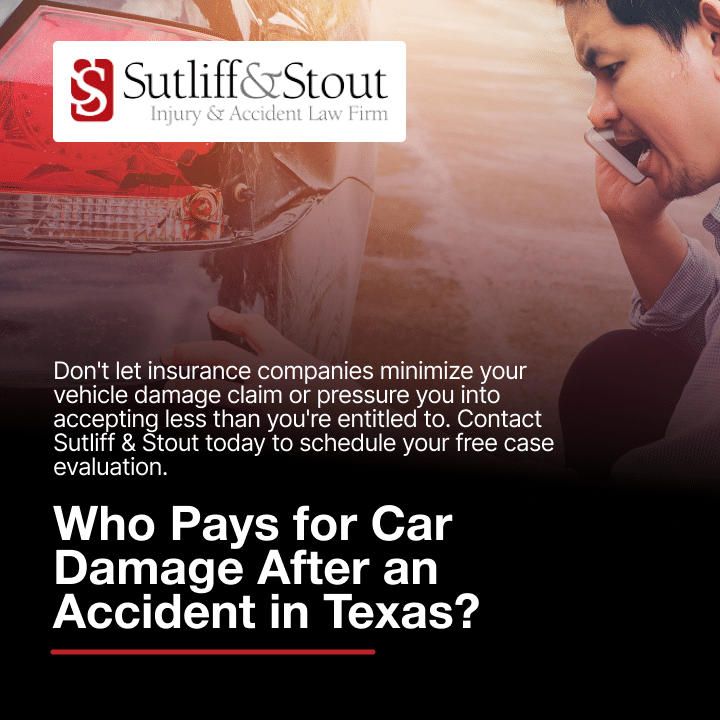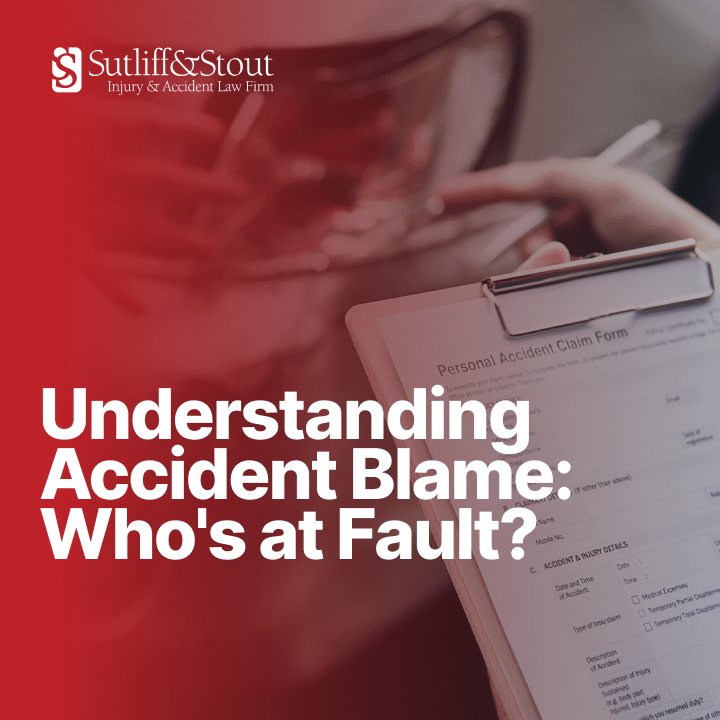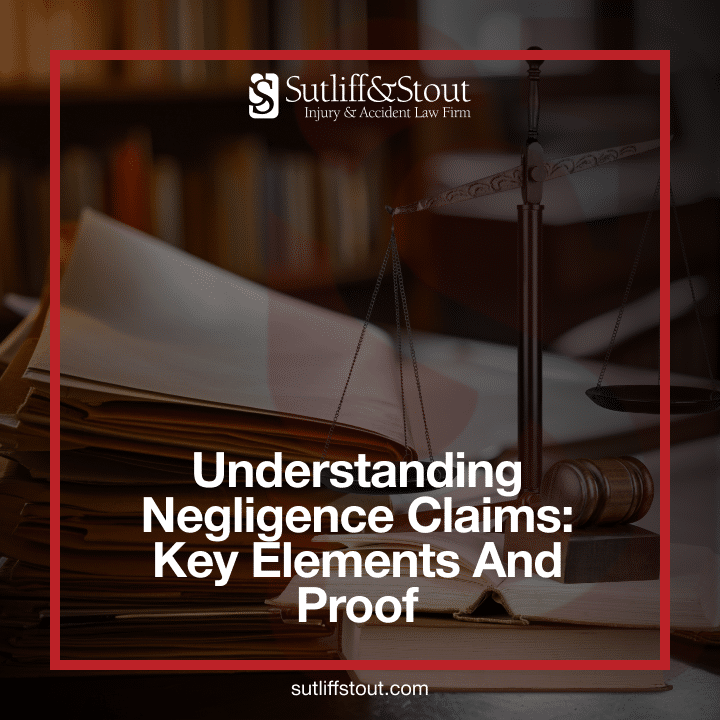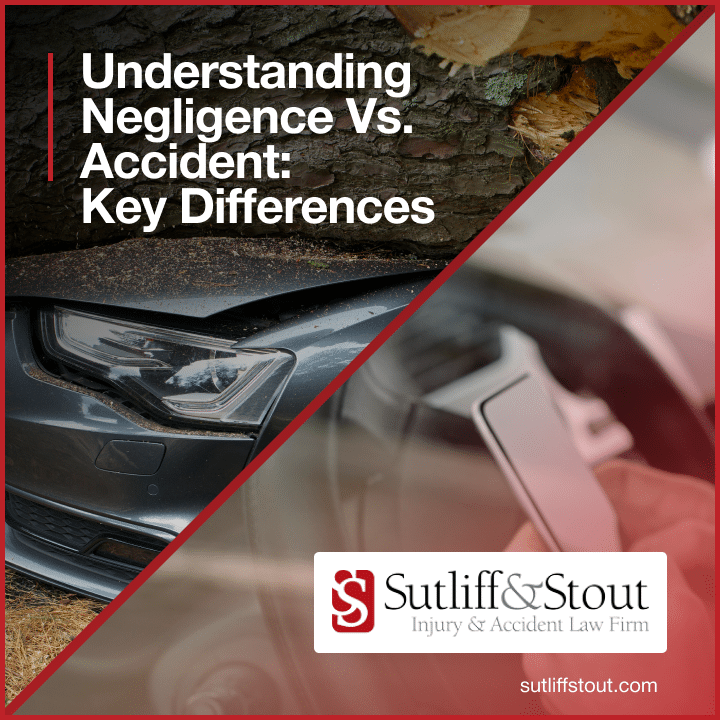
Being involved in a car accident is stressful enough without having to worry about who will pay for the damages to your vehicle. As experienced car accident attorneys at Sutliff & Stout, we understand that navigating the aftermath of a collision can be overwhelming. Texas has specific laws governing who is responsible for covering vehicle damage costs, and understanding these regulations is crucial to ensuring you receive the compensation you deserve.
What Determines Payment Responsibility?
When it comes to determining who pays for car damage after an accident in Texas, several factors come into play. Texas follows a “fault-based” system, which means the person who caused the accident is typically responsible for covering the resulting damages. However, the situation isn’t always straightforward.
At Sutliff & Stout, we’ve seen countless cases where determining payment responsibility becomes complex due to shared fault, insurance coverage limitations, or disputes about the accident’s circumstances. Texas law considers elements such as driver negligence, traffic violations, and even environmental factors when establishing who should pay for vehicle repairs.
Insurance’s Role in Car Damage Payment
Insurance plays an important role in covering car damage after an accident, but the type of coverage you and the other driver have will significantly impact how payment is handled. Understanding your policy and the other driver’s coverage is essential for navigating the claims process effectively.
The car accident attorneys at Sutliff & Stout regularly assist clients in understanding their insurance options and rights following an accident. Let’s examine the different types of insurance coverage that might apply to your situation.
Collision Coverage
Collision coverage is an optional insurance that pays for repairs to your vehicle regardless of who caused the accident. If you have collision coverage, you can file a claim with your own insurance company to cover repair costs, even if you were at fault.
This coverage typically comes with a deductible—an amount you must pay out-of-pocket before your insurance kicks in. If another driver was at fault, our car accident attorneys can help you pursue reimbursement for your deductible from the at-fault driver’s insurance.
Comprehensive Coverage
While collision coverage handles damage from accidents with other vehicles or objects, comprehensive coverage addresses damage from non-collision incidents. This includes theft, vandalism, natural disasters, falling objects, or hitting an animal.
Like collision coverage, comprehensive insurance requires a deductible payment. The legal team at Sutliff & Stout can review your policy to ensure you’re receiving all the benefits you’re entitled to under your comprehensive coverage.
Liability Insurance
In Texas, all drivers are required to carry liability insurance with minimum coverage of $30,000 for injuries per person, $60,000 per accident, and $25,000 for property damage (30/60/25). When another driver is at fault, their liability insurance should cover your vehicle repair costs up to their policy limits.
However, if your repairs exceed the at-fault driver’s property damage limit, you may need to rely on your own insurance or pursue additional legal actions. The experienced car wreck attorneys at Sutliff & Stout can advise you on the best course of action in such situations.
Impact of Fault in Insurance Claims
The determination of fault has significant implications for how car damage is paid for after an accident in Texas. Understanding how fault affects your claim is crucial for maximizing your recovery.
As seasoned car crash lawyers, Sutliff & Stout has extensive experience helping clients navigate Texas’s fault system to ensure they receive fair compensation for vehicle damage.
Determining Fault
In Texas, fault is typically established through police reports, witness statements, physical evidence, and sometimes accident reconstruction. Insurance adjusters use this information to assign percentages of fault to each driver involved.
Common indicators of fault include traffic violations, distracted driving, impaired driving, or failure to adjust to weather conditions. The auto accident attorneys at Sutliff & Stout know how to investigate accidents thoroughly to establish accurate fault determinations that protect your interests.
What is Modified Comparative Negligence?
Texas follows a “modified comparative negligence” rule with a 51% bar. This means if you’re found to be partially at fault for an accident, your recovery will be reduced by your percentage of fault—as long as you’re not more than 50% responsible.
For example, if you’re deemed 20% at fault for an accident with $10,000 in vehicle damages, you could recover 80% or $8,000. However, if you’re found to be 51% or more at fault, you cannot recover damages from the other party. Sutliff & Stout’s legal team can help you contest unfair fault allocations that might reduce your compensation.
Uninsured or Underinsured At-Fault Parties
Unfortunately, not all drivers on Texas roads carry adequate insurance—or any insurance at all. When you’re involved in an accident with an uninsured or underinsured driver, obtaining compensation for your vehicle damage can become challenging.
At Sutliff & Stout, we’ve helped numerous clients navigate these difficult situations, exploring every possible avenue for recovery when the at-fault party lacks sufficient coverage.
Uninsured Motorist Coverage
Uninsured motorist (UM) coverage is an optional addition to your insurance policy that protects you if you’re hit by a driver with no insurance. This coverage typically includes both bodily injury and property damage protection.
If you have UM coverage and are involved in an accident with an uninsured driver, you can file a claim with your own insurance company. The car crash attorneys at Sutliff & Stout can guide you through this process to ensure your claim is handled fairly.
Underinsured Motorist Coverage
Similar to uninsured motorist coverage, underinsured motorist (UIM) coverage applies when the at-fault driver has insurance, but their policy limits aren’t sufficient to cover all your damages. UIM coverage can make up the difference between the at-fault driver’s insurance payout and your actual repair costs.
Our car accident attorneys can help you understand when and how to utilize your UIM coverage to maximize your recovery for vehicle damage.
Legal Actions Against Uninsured Drivers
When you’re hit by an uninsured driver and don’t have UM coverage, you may need to pursue legal action directly against the at-fault driver. While this can be more challenging than dealing with insurance companies, it may be your best option for recovering repair costs.
The legal team at Sutliff & Stout has experience filing lawsuits against uninsured drivers and can advise you on whether this approach is likely to be successful in your specific situation.
Immediate Post-Accident Actions for Coverage
The steps you take immediately following an accident can significantly impact your ability to recover compensation for vehicle damage. Proper documentation and communication are essential for supporting your claim.
We recommend taking specific actions after an accident to protect your right to compensation and strengthen your position when dealing with insurance companies.
Documenting the Accident Scene with Photos
Comprehensive photo documentation of the accident scene, all vehicles involved, and any relevant road conditions or traffic signs can provide crucial evidence for your claim. Be sure to capture images from multiple angles and distances.
The legal team at Sutliff & Stout often relies on accident scene photos to establish fault and the extent of damages when advocating for clients’ claims with insurance companies.
Exchanging Information with the Other Driver
Texas law requires drivers involved in accidents to exchange contact and insurance information. Be sure to collect the other driver’s:
- Full name and contact information
- Driver’s license number
- License plate number
- Insurance company name and policy number
If the other driver refuses to provide this information, contact the police immediately. At Sutliff & Stout, our car accident lawyers can help you track down necessary information if you were unable to collect all details at the scene.
Reporting the Accident to Both Insurance Companies
Report the accident to your insurance company as soon as possible, even if you weren’t at fault. Many policies have prompt reporting requirements that could affect your coverage if not followed.
You should also report the accident to the at-fault driver’s insurance. At Sutliff & Stout, our attorneys recommend being cautious when speaking with the other driver’s insurance—keep your statements factual and concise, and consider consulting with an attorney before providing a recorded statement.
Understanding Deductibles in Claims
Deductibles are a critical component of the car damage claim process and can significantly affect your out-of-pocket expenses after an accident.
At Sutliff & Stout, we help clients understand how deductibles work and the strategic considerations that should inform their insurance choices.
How Deductibles Affect Claim Payouts
When you file a claim using your own insurance (collision or comprehensive), you’ll need to pay your deductible before your insurance covers the rest. For example, if repairs cost $3,000 and your deductible is $500, you’ll pay $500 and your insurance will cover the remaining $2,500.
If another driver was at fault, our legal team can help you seek reimbursement for your deductible through the at-fault driver’s insurance or through subrogation, where your insurance company pursues reimbursement from the at-fault party’s insurer.
Choosing the Right Deductible for You
Selecting the appropriate deductible is a balance between monthly premium costs and potential out-of-pocket expenses after an accident. Higher deductibles generally result in lower premiums, but mean more immediate costs if you need to file a claim.
The legal team at Sutliff & Stout can discuss the pros and cons of different deductible options based on your financial situation and risk tolerance, helping you make an informed decision that provides adequate protection while remaining affordable.
Disagreeing with the Insurance Company’s Decision
Insurance companies don’t always offer fair settlements for vehicle damage claims. If you believe your claim has been undervalued or wrongfully denied, you have options to dispute the decision.
The car accident attorneys at Sutliff & Stout have extensive experience challenging unfair insurance practices and can help you navigate the appeals process to fight for the compensation you deserve.
Filing an Internal Appeal
Most insurance companies have an internal appeals process that allows you to contest claim decisions. This typically involves submitting additional documentation, such as independent repair estimates or expert opinions on the value of your vehicle.
At Sutliff & Stout, our legal team can help you prepare a compelling appeal that addresses the specific reasons for the insurance company’s initial decision and provides strong evidence to support your position.
External Appeal Options
If an internal appeal doesn’t resolve your dispute, you may have external options, including:
- Filing a complaint with the Texas Department of Insurance
- Pursuing arbitration or mediation
- Filing a lawsuit against the insurance company
The attorneys at Sutliff & Stout can evaluate your case to determine which approach is most likely to yield favorable results and guide you through the chosen process.
Consulting with a Car Accident Attorney for Legal Recourse
When dealing with complex car damage claims, especially those involving disputed fault or significant repair costs, consulting with an experienced car accident attorney can make a substantial difference in the outcome of your case.
At Sutliff & Stout, our attorneys understand the intricacies of Texas insurance law and have a proven track record of successfully advocating for clients dealing with car damage claims. We can help you understand your rights, evaluate your options, and develop a strategy to maximize your recovery.
Whether you’re facing resistance from an insurance company, dealing with an uninsured driver, or struggling to get fair compensation for your vehicle’s diminished value, our legal team has the knowledge and resources to help you navigate these challenges effectively.
We’re on Your Side – Call Now for a 100% Free Consultation!
Dealing with car damage after an accident shouldn’t add to your stress. At Sutliff & Stout, we’re committed to helping Texas drivers understand their rights and options for recovering repair costs after collisions.
Our experienced car accident attorneys offer 100% free consultations to discuss your case and provide personalized guidance based on your specific situation. We’ll evaluate your claim, explain your coverage options, and help you develop a strategy to secure the compensation you deserve—all at no upfront cost to you.
Don’t let insurance companies minimize your vehicle damage claim or pressure you into accepting less than you’re entitled to. Contact Sutliff & Stout today to schedule your free case evaluation. Our dedicated legal team is standing by to advocate for your interests and ensure you receive fair treatment throughout the claims process.
- Bicycle Accident Compensation: What You Need To Know - July 3, 2025
- Understanding Wrongful Death Compensation in Texas: Types and Eligibility - June 15, 2025
- Understanding Car Accident Court Cases - June 2, 2025








 (713) 405-1263
(713) 405-1263  550 Post Oak Blvd, Suite 530
550 Post Oak Blvd, Suite 530